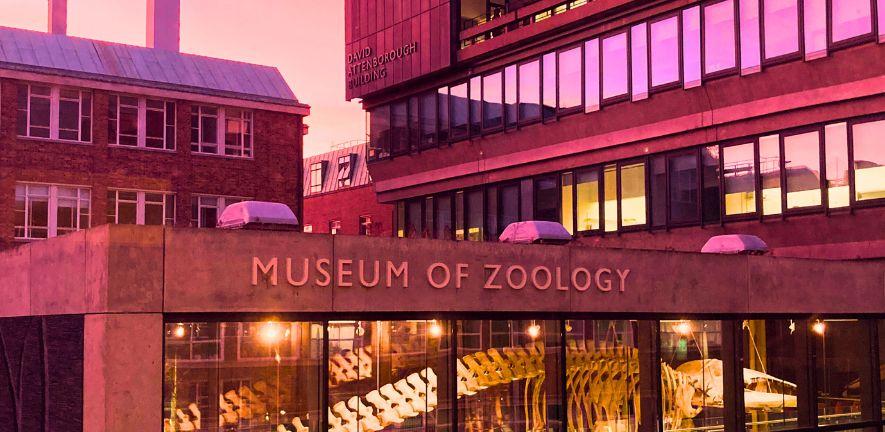
The Department of Zoology is situated in the heart of Cambridge's historic city centre, with a field station in the nearby village of Madingley. We occupy four buildings on the New Museums site including the historic main building and the award-winning David Attenborough Building (DAB).
The DAB houses our outstanding Museum of Zoology and the Cambridge Conservation Initiative in which some of our staff are based. The Department consists of around 350 people, including faculty, postgraduate students, research staff, fellows, and visitors, all supported by 50 professional services staff.
Research
Our research ranges across animal biology from cell biology to conservation policy. It is organized into four themes, but in practice often bridges the boundaries between disciplines. We have strengths in various areas including evolutionary biology, behavioural ecology, developmental biology, and ecology. Our research often has a distinctive approach within a field reflecting our particular interests in the functioning of whole organisms, and questions relating to evolution adaptation and biodiversity.
We pride ourselves on the outstanding quality of our research and its impact. In the recent Research Excellence Framework 2021 exercise, we returned 38 academics within the Biological Sciences unit of assessment. 66% of Cambridge’s submissions in Biological Sciences were awarded the highest rating of 4* overall, meaning they are ‘world-leading’. This is an increase from 52% in 2014. A further 30% of submissions were rated 3* overall (internationally excellent).
Our research is supported by over 110 research grants with a total value of over £49m. The principal funders include the UK Research Councils - Biotechnology and Biological Sciences Research Council, Natural Environment Research Council and Medical Research Council, charities such as the Royal Society, the Wellcome Trust, the Leverhulme Trust, and Cancer Research UK, along with international organizations including notably the European Research Council, the US National Institutes of Health and Biomedical Advanced Research and Development Authority.
See our Research pages for more information
Undergraduate Teaching
Members of the Department provide high quality and enthusiastic teaching that covers a diverse range of topics from single-cell organisms to whole ecosystems; from the outset, students are taught by experts at the forefront of modern scientific research through a combination of lectures, practical classes, and small group teaching (supervision). We also organise several field courses, including a Tropical Biology field course in Panama or Borneo.
Our final year course, Part II Zoology, offers a great degree of flexibility and variety; students choose four modules from sixteen; these modules cover a diverse range of topics, including animal behaviour, conservation science, ecology and evolution, cell and developmental biology.
See our Study pages for more information
Postgraduate Education
There is a strong and lively postgraduate community in the Department, with support available from academic and administrative staff. About 100 postgraduate students study in the Department at any one time at both MPhil and PhD level. There are regular programmes of postgraduate and staff seminars, held both within the Department and in related departments throughout the academic year.
See our Study pages for more information
University Museum of Zoology
The Museum is one of Cambridge's major attractions, displaying thousands of specimens spanning the entire animal kingdom, from elephants, giant ground sloths, and giraffes, to birds, reptiles, insects, and molluscs. It usually welcomes over 150,000 visitors every year.
The collections are amongst the best in the world. As well as being open for the public to enjoy, they are used for academic study by researchers and students worldwide. The museum has a lively and innovative science outreach programme and each year hosts hundreds of educational group visits, regularly holds Cambridge Festival events as well its own Zoology Live! event.
See the Museum of Zoology website for more information.
Working Environment
We aspire to provide an inclusive, supportive, and open atmosphere for everyone who works here, staff, students, and visitors alike. We value diversity and all members of the Department are working hard to enhance our diversity, as has been recognised by our Athena SWAN Charter Silver Award. We also aim to make our working practices as family-friendly as possible.
All staff and students are encouraged to play a full part in the life of the Department through teaching, research, attending a range of seminars and regular staff meetings not to mention morning coffee and other activities aimed at wellbeing.
See our Equality, Inclusion, and Wellbeing page for more information
Facilities
Zoology Library
The official name of the Zoology Library is the Balfour & Newton Libraries, in memory of Francis Maitland Balfour, Professor of Animal Morphology, and Alfred Newton, the first Professor of Zoology. Balfour's books, given by his family to form the nucleus of the Zoological Department Library. The Newton collection, of ornithological importance, was bequeathed to the Museum of Zoology in 1907. The Library collections now include thousands of books covering the breadth of zoology teaching and research.
The Library also offers pleasant and quiet study space, many of these are in the historic part of the building with plenty of natural light.
Cambridge Biotomography Centre
The Centre hosts an industry-leading X-ray and CT system range for non-destructive, high-resolution inspection and metrology and is based in the basement of the Museum.
Imaging Facility
The Zoology Imaging Facility is part of the School of Biological Sciences Microscopy Bioscience Platform. It provides members of the Department and the wider research community with access to confocal microscopes. High-performance computer workstations are available for image processing and analysis.
School of the Biological Sciences
The Department of Zoology is part of the School of the Biological Sciences. The School is home to animal, human, plant, and microbial science at the university and has recently developed 6 key research themes. They are cross-cutting research themes that will provide integration across the School, encourage new conversations and enhance interdisciplinary networking critical for major innovation.
See the School of the Biological Sciences website for more information
Image: photo by Louise Balshaw
